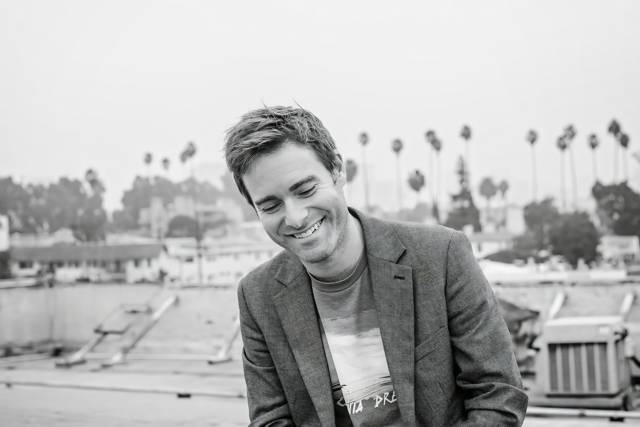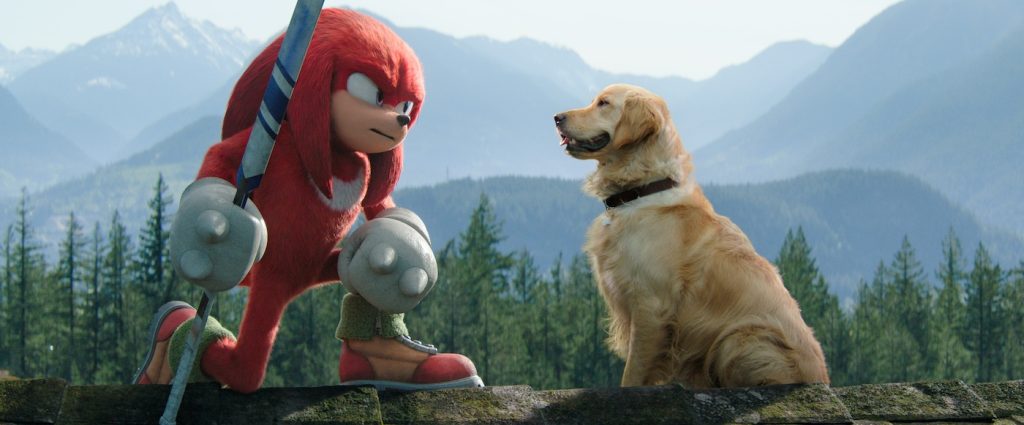“Knuckles” Composer Tom Howe on Scoring the Speedy Warrior’s Paramount+ Debut
Composer Tom Howe constructed the score for Paramount+’s superpowered new series Knuckles, putting the warrior Knuckles the Echidna from the Sonic the Hedgehog universe at the center of the action.
“He’s like Sonic, but more fun, more attitude, and probably more fun to have a beer with or go out for dinner with,” Howe says of the titular character. Howe also benefited from an added element that made the sound of Knuckles so appealing—the voice of Knuckles himself, played by Idris Elba. “Idris Elba’s voice is fantastic, with a sort of gravitas. It helps the character a lot. Knuckles is so committed to being a warrior. He has that superhero quality. The fact that he’s so into it gives it believability, but it also play as a comedy or be straight as well. I think he’s a great character.”
In an interview with The Credits, Howe talks about mixing genres and tones in the series, recording in the legendary Abbey Road studio, the inherent music of Idris Elba’s voice, and making friends with the cast of Ted Lasso.

Where did you grow up, and what was the first instrument that you played?
I grew up in England, and the first instrument I played was the piano. My dad played the piano, organ, guitar, and drums, and my parents sang in a choir, so I was exposed to church music early on. Piano was the first thing I learned, and then I took up guitar at about eight or nine, and clarinet, and I did a lot of singing choirs and things.
How did you start piecing together the score for Knuckles?
Well, it’s challenging. I started by coming up with thematic ideas for the different characters. I spent a lot of time thinking about the Knuckles character, obviously the star of the show. What I ended up with is actually a very simple tune, but it took me a long, long time to get there. The score can be very heroic, but at the same time, you can hear a couple of notes of it with a comedy cue. There’s a lot to contend with in this show. Even the episodes jump around. You go from the end of episode one, when they’re in a bowling alley, to having a full-on fight, which looks very much like a video game. They’re jumping around, there are lasers. And in episode three, you’re at a family dinner. In episode four, you’re in a musical.
That’s a tremendous amount of variety for a single series.
In episode one, Knuckles initially runs up the hill, and you see this huge landscape shot of green hills before he runs down and takes out the workmen. Obviously, a big landscape shot like that can have a big, wide-scale sound. But when you’re in a family dinner with just three people and Knuckles, it won’t take the same kind of palette. So, you’ve got to feel your way around that and work out what the picture can take and what’s suitable for the characters in the story. So that made it very fun. But as a composer, there are a lot of different things to deal with, and you don’t want to over-egg a pudding.

Knuckles is voiced by Idris Elba, who has that fabulous voice that’s its own kind of music. How does that help you with what you’re creating?
It really helps. His voice reminds me of David Attenborough. There is a lot of talking, the voice is very low, and a lot of the music is sitting above that. There’s very little going in the bottom end of that except for the action cues within that episode.
There are a lot of special effects in this show. When do you enter the process? Do you get the script or storyboards, or are you actually looking at the final visuals?
I get a complete picture, but it’s forever changing in length, and this scene’s now over here, or that bit that was there is now gone completely. It’s an ever-moving thing until they lock it down. If you work on a drama, they may change the edit, but fundamentally, the shots are the shots. But when you’ve got an animated character like Knuckles, in any of the scenes he’s in, when the special effects shots come in, it will all be a little bit longer or a little bit shorter. It may only a frame here and there, but when you start doing that over a number of sequences, all the music timings will have to move around.
I get an early picture to look at, and that’s when I’ll have a conversation with the filmmakers. We’ll talk about what a particular scene needs, whether it needs music, and if it does, what the music is doing, what the mood behind it is, or what the intention behind it is. I then start trying to kind of put things down, but at that point, it is an ever-moving thing. Every time you move forward, you have to go backward and fix something. I remember in episode six when Knuckles was in the last battle there, and Wade gave a fantastic speech. What I actually see is Wade standing in front of a blue screen. Giving a great performance is challenging enough, but to do it when you’re on your own is really difficult, I’m sure.
There’s a very varied selection of surprising needle drops on the soundtrack. In the first episode alone, you have Edith Piaf and A Tribe Called Quest.
Matt Biffa selected those in collaboration with the filmmakers. Toby Ascher, one of the producers, was also very involved.
What’s the most fun about writing for Knuckles?
The breadth of the palette that you get to play with. If you have a dark drama project, all of the music is going to be in that world. There are not many projects where you can jump around like that and still keep a throughline in terms of melody and instrumentation choice. Episode four has a lot of electric guitars in it, but the others don’t. Episode three has a lot of solo violin and mandolin, but not a lot of the others do. It is a lot of fun to put on these different hats while trying to thread a needle and make it sound like one thing.
Are there individual musicians playing all these parts, or are you creating it on a synthesizer?
I do a demo here in my studio; any pianos, guitars, if there are drums, I will play those here. I have a setup that allows that. But for Knuckles, a lot of it was orchestral, particularly in the big action moments. So, I went to Abbey Road for four episodes and AIR Studios in London for two episodes with an orchestra. And it’s all played and recorded for real, which obviously gives it a quality that can’t be obtained by samples as well as when you get all the musicians together.
What’s your next project?
I’m finishing a David Attenborough series for the BBC and then starting Shrinking season 2 for Apple.
You worked with the Shrinking people on Ted Lasso, too, right?
Yes, of all the things I’ve ever worked on, Ted Lasso was unusual because it went on a long time and because I was involved on some of the things on set as well. I became very friendly with all the actors and filmmakers, and that carries on to this day. I actually had dinner with Nick Muhammad two nights ago, just the two of us in the pub. He’s a fantastic violin player, and I’m also friends with Phil Dunster and Hannah Waddingham. I see Jason Sudeikis when he is in town. So that’s been a lovely thing to be a part of.
Knuckles is streaming on Paramount+
For more films and series from Paramount and Paramount+, check out these stories:
Chris Hemsworth Eyeing Role in “Transformers” and “G.I. Joe” Crossover Movie
Devastation & Determination in a New “A Quiet Place: Day One” Featurette
How the Animation in John Krasinski’s “IF” Came to Live Seamlessly Among Live-Action
Featured image: Knuckles (voiced by Idris Elba) in Knuckles, episode 6, season 1, streaming on Paramount+, 2024. Photo Credit: Paramount Pictures/Sega/Paramount+.


